One of the most cinematic, atmospheric experiences you can have right now in the world of coffee is available 24 hours a day, completely free of charge, right inside your pocket. It’s on Instagram; specifically the Instagram of Gilly Brew Bar, a coffee company very much unlike any other coffee company I’ve come to know in my decade-plus reporting on the specialty coffee industry.
“We are not a coffee shop”, Gilly declares proudly, and frequently, on its official website and across social media. On the internet, Gilly feels as much like a literary or theosophical intellectual project as it does a beverage emporium. In the actual bar, you’ll find a dazzling seasonal rotation of drinks, each one anchored with intent and meaning evoking past and present thought leadership, reconfiguring coffee’s role from a status symbol or desultory consumption habit into something that echoes with deeper meaning: spiritual, health, mind, soul.
At first, it feels like doublespeak to say “We are not a coffee shop”, a Magritte-esque intentional absurdity: Ceci n’est pas une cafe. But interrogate this and you’ll see that Gilly’s founders, Daniel Brown and Nephthaly Leonidas, are building towards the intentional dissolution of long-established hierarchies, boundaries, and barriers presented by the traditional cafe experience. A reimagining of what coffee is, who it’s for, and how we experience it.
It’s an overused trope—”disruption”—the idea that entrepreneurs of any generation (though it’s been especially abused by Millennials and Gen Z) are building an approach to business culture that shatters preconceived norms and notions about, well, everything, from history to economics to culture. I say this by way of explaining that I don’t take using the term lightly; if you’re going to call someone disruptive in this day and age, you had better mean it and be able to back it up.
This is what Gilly is. They’re disrupting multiple threads in the modern coffee space with dazzlingly fluent simultaneity. We saw a spark of this in 2019, when Daniel Brown was nominated to the inaugural class of the Sprudge Twenty project, and have followed along in the years since as Gilly’s work has bloomed and blossomed. Today, perched on the precipice of opening their second full-time location, and going from strength to strength operating wildly popular pop-ups, the original Gilly Brew Bar in Stone Mountain stands in rare air for the American coffee experience. It’s simply one of the best coffee shops in the country, period, end of story—except it’s not a coffee shop. Remember? Look closer.
An in-depth conversation with Daniel Brown is an event and a privilege, something we’re thrilled to give pride of place on this editorial platform, Sprudge Special Projects Desk. Read on for a gently edited and condensed conversation between myself and Daniel Brown.
Jordan Michelman: Daniel — this is really a pleasure, thank you so much for speaking with me today. We have time to stretch out and talk for this interview, and I have a lot of things I want to get to, but first and foremost: how are things going for you and your team right now around Atlanta?
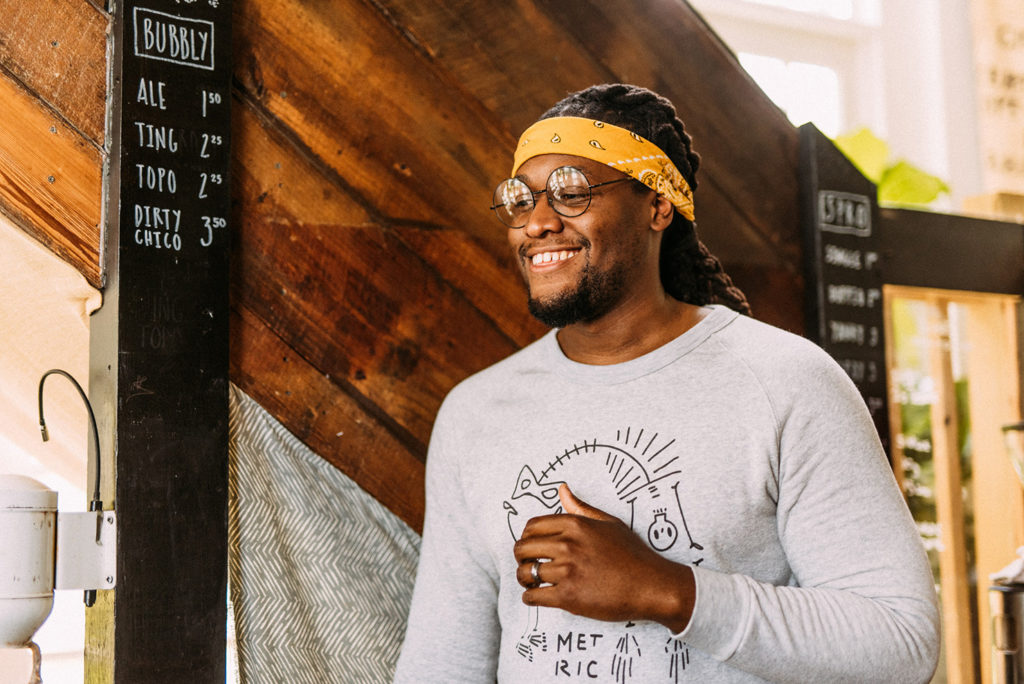
Daniel Brown: Oh man! We’ve been busy, honestly. Things have been crazy. We never really fully shut down here, man, but it’s been crazy. Fortunately, a lot of things for Atlanta and the country are headed in a better direction.
That’s good to hear. I want to know upfront because we’ve been following really closely on social media: where are you at in the process of opening at Peters Street Station in Atlanta?
Peters Street is still in the works. And what I mean by that is, the space is built out, but the inspections have come along slowly, and honestly, the biggest hold up now is with the inspectors. Inspections are never fun, you know, but what makes it even more interesting now is that all of our inspections have been virtual, which has been really dragging out the process. As of today, we have submitted our application to the county, and we’re waiting for our health inspection, and then we’ll be good to go. There’s no set date yet to open, but we’re shooting for this spring.
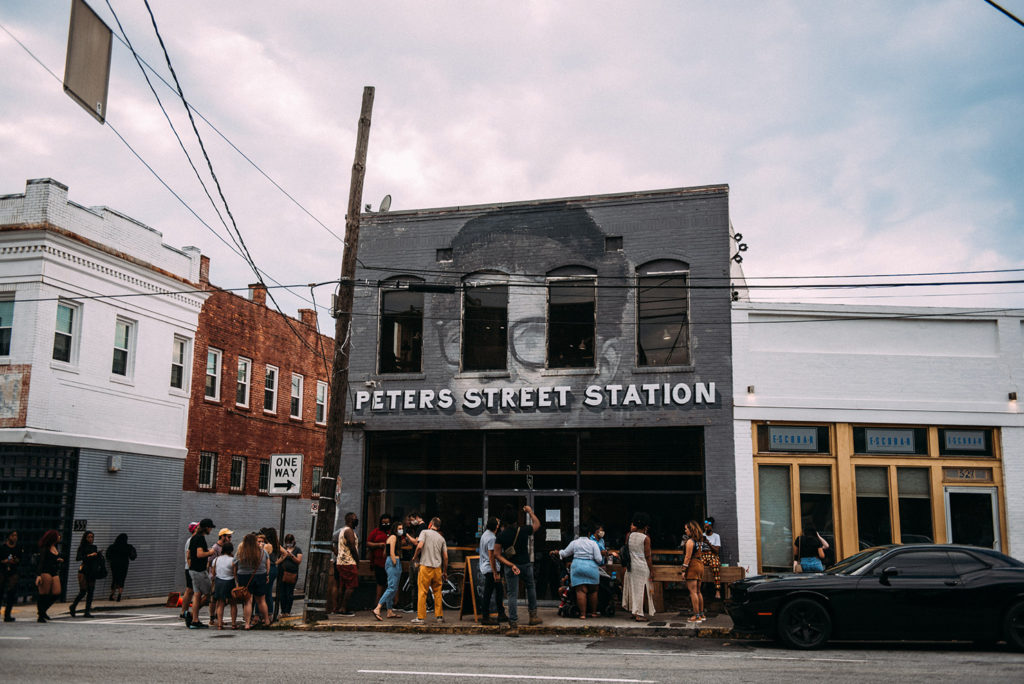
Tell me more about what you’re going to do there, and how Peters Street will differ from your first cafe at Stone Mountain.
So we’ll definitely stick to our core mission, which is to reimagine coffee culture and to help other people reimagine coffee culture. At Stone Mountain one of the ways we do that is with our elixirs, which are uniquely developed drinks based on seasonal timelines; we typically introduce 5 new beverages every three months. At Peters Street, we’ll have the elixir as well but they won’t necessarily come out with 5 new ones every three months. We want our drinks there to look more like a collaboration with the vibe of that community. Peters Street is located in Castlebury Hill, which is an arts district with a very active artist community, and the building we’ll be in actually has a gallery in the back where artists display and sell artwork, so our goal is to create drinks that are more customized around the pieces you can view in the gallery. This means a drink may not be on the menu for three months; it might be much shorter, and it will create an opportunity for innovation and customization around the ideas presented by the visual artists.
That’s awesome.
Yeah man, I think that it will be an amazing experience for people to visit the gallery then try something inspired by the art they’re looking at, especially with people who really value art—we want to captivate those kinds of people who would spend 10 minutes soaking in a beautiful piece of artwork and then be able to appreciate our interpretation of that in drink form. That’s where I’m hoping this concept goes.
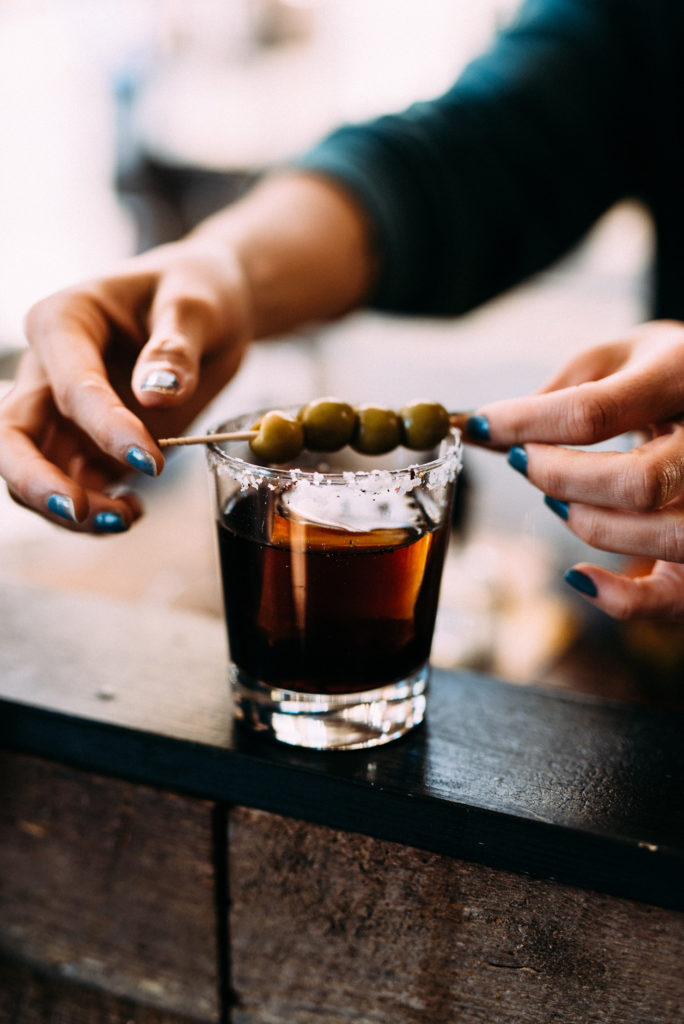
Back at your Stone Mountain cafe, “James & James” was the theme for your winter menu, which is based around the biblical Book of James and the works of James Baldwin. We’ll talk about the next season in a moment, but honestly, this past menu deserves some conversation and thought first, because it’s fascinating. Where did the spark of this idea come from?
Our approach to elixir seasons have always stemmed from where we’re currently at as a company. We try to share a story based on what we’re experiencing, and with the climax of all the protests in 2020, we thought it would be amazing to stay on that highlighting someone like James Baldwin.
During his career, a lot of people had a hard time trying to figure out if James Baldwin was actually an activist or just a phenomenal writer? I think people still struggle with that, but ultimately we consider him an activist, because everyone has their own style and way of doing things, and he was able to reach a particular audience that people like Malcolm X or Martin Luther King weren’t able to capture. Baldwin did that with what his strengths were.
The truth is, activism doesn’t have to look like what Malcolm did or what Martin did; they did the job their way but Baldwin did it, too, and participated in activism through his word. We wanted to highlight a lot of his work with these drinks, and then we found some really cool parallels with the Book of James.
Essentially, the Book of James is a rebuke to the church, and James Baldwin, his writing was like a rebuke of America. We thought it was a beautiful way to share those stories, and to highlight our own rebuke to coffee culture. There is a narrative we have been painting since the very beginning, the idea that, simply, “We are not a coffee shop.” People ask us all the time what that means, and the truth is, for a very long time, coffee culture has had many negative associations as an early sign of gentrification, as a culture of products over people, the snobby barista persona. Of course, not everyone is like that, but we knew we didn’t want to be defined in that way. We wanted people to understand that wherever a Gilly Brew Bar is, we want to be about championing people. Looking at it from a hospitality standpoint where we get to serve the community we’re in. That means we get involved, we go to city council meetings, we meet our neighbors, and we embed our coffee and tea program into the needs of the community.
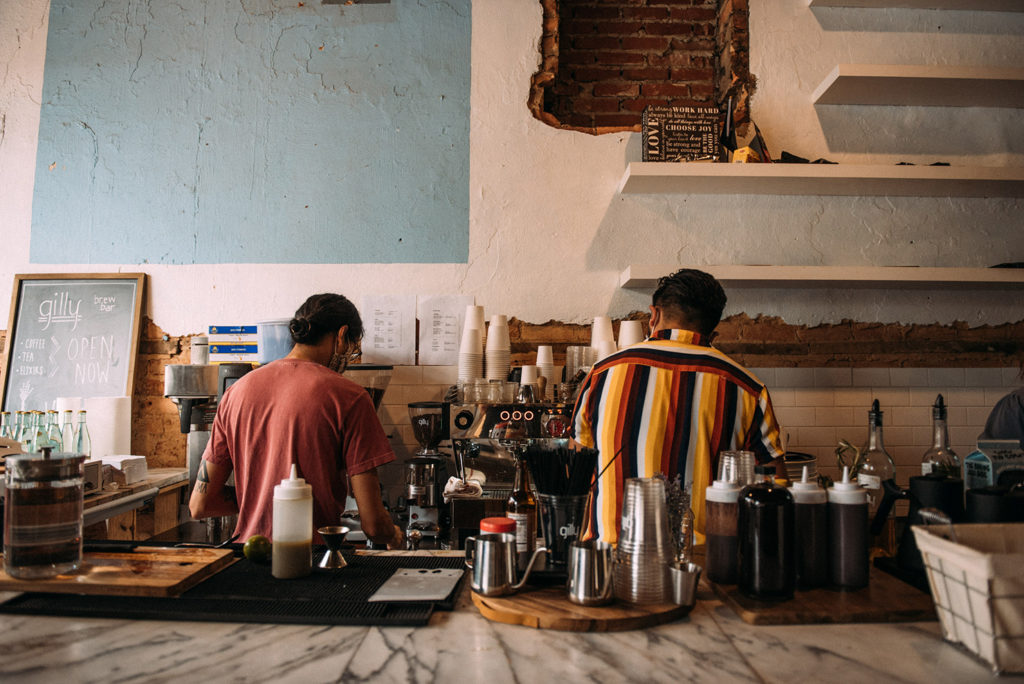
There are some wild flavor notes on the James & James menu — the drink “Chapter One” is compared to “soup on the rocks”, the “Chapter Two” is a “Marlboro Red” — those are really fantastic and unusual descriptions. I want to know more about the process you and your team go through in building these drinks and notes: how many heads are in on that work? How collaborative is it?
Once we kind of evaluate where we are—in our personal lives and as a team—then we start thinking about certain flavors that feel like might help interpret the story. These are seasonal drinks with seasonal ingredients, above all else. Most winters, we tend to go a little more nutty or savory, to match the season. We’re a small team creating these drinks: it’s me and two other people, including Nephthaly Leonidas, who is the co-owner at Gilly. She is a huge part of creating the seasonal menus, as well as one of our bar leads, Yvonne TK, who since the beginning has always shown interest in creating the drinks and has really taken a lot of lead to help us establish these menus.
The James & James collection was pretty much built on our discussions. It’s crazy, you know—I think a lot of people assume we have all these themes lined up, but honestly once the season ends we take a sabbatical. We step away from the elixir for two weeks or two and a half weeks, so we can rest and feel out the season for what comes next. It’s not a big team at all developing these drinks; once we establish the storyline and the key ingredients then we involve the rest of the team to help us dial in and evolve, building out the brew ratios and recipes, but at the end of the day, it’s about figuring out the key things that are standing out to us, and we just build off of that.
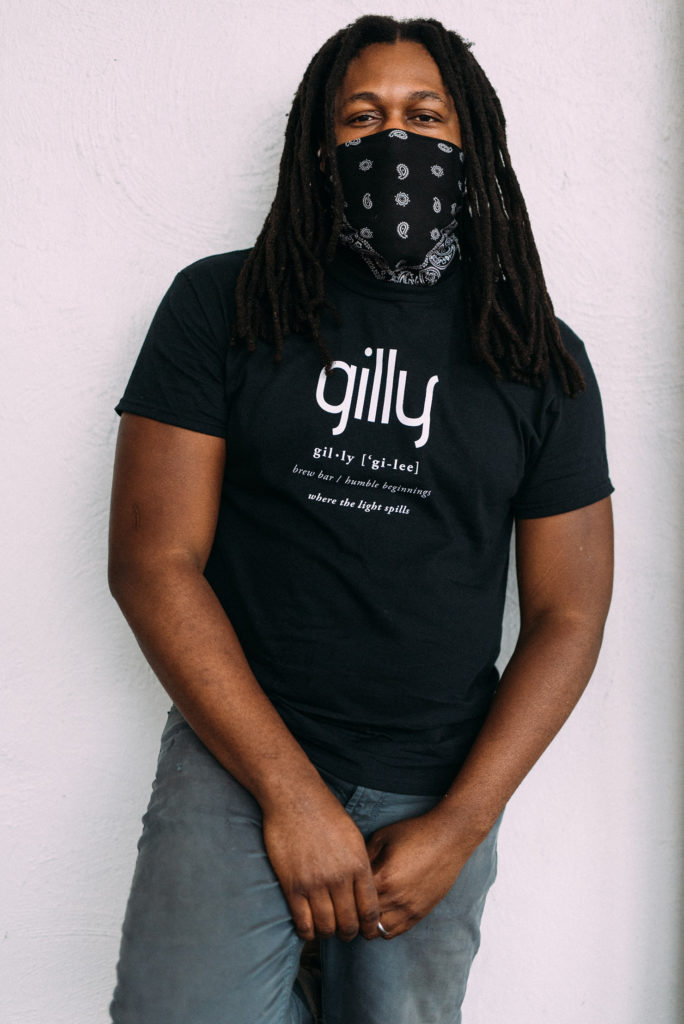
As a coffee company, a cafe, a social media presence—”a brand” for lack of a better whatever—Gilly really seems to lead by feel and emotion. You wear influences and inspirations on your sleeve and it’s very connective. How do you manage this approach to emotion with the actual work of social media posting, or menu building? Is the fusion effortless? Is it harder than it looks?
It can be difficult at times man! Our Instagram has become like a billboard for the elixir that season, they kind of work hand in hand. We’re thinking a lot about storytelling through social media, especially with the second location coming: where do we want to go? What do we want to create for that location? How do we intertwine that work, even if we don’t have similar menus?
Something we want to do now is to establish our own YouTube channel, especially after being featured by James Hoffmann’s channel. That’s something we’re going to go heavy on for storytelling, including menu exploration, how-to videos, and more to give viewers an understanding of the story from beginning to end.
Elixirs are this huge focus of what you do at Gilly. Some people would call them like, “signature drinks” in the competition parlance, or maybe “coffee mocktails” — why is that word elixir important to you?
That’s a great question. You know, my introduction to coffee was more from a medicinal standpoint. As a child I grew up with asthma—my mom would use coffee to open up the chest cavity when it’s hard to breathe. It’s amazing how coffee can do that! Caffeine opens up your chest, and this really helped me. So from a young age, I was able to develop a mature palate for coffee, and when it came to opening Gilly, especially since I didn’t come from a traditional coffee work background or previous experience in a coffee shop, parts of how I understood this product was different. And I want to express that from the very beginning.
I decided to call these drinks “elixirs” because that word, to its true definition, means a kind of house remedy, medicine or concoction that’s made to help you recover from an ailment. Your grandmother may have made you chicken soup; for me, in my family, we saw coffee and tea as a kind of medicine, and I wanted to choose a word that would help express and embed that in people’s heads. Coffee is not just something you consume or enjoy for the flavors. We also want to express that it is a medicinal product, that can be healing to your soul. And the storytelling is all a part of that.
You said “mocktails” – to me, that’s an imitation of a cocktail, which is itself a drink that’s meant to put you under the influence. That’s different from an elixir, which is really more of a libation. If you follow that definition, a libation is a beverage that’s been prepared for a higher deity. We try and pay homage to the creator of this product we’re using now, how it’s cultivated by farmers. We like to point back to the idea of there being a higher source that makes it possible for us to be able to share good news through a drink. That has always been a part of this work for us, the community and discussion it facilitates. It’s about creating a beverage that’s healing to someone’s soul. They may consume it in five or ten minutes, but it leaves a lasting impression.
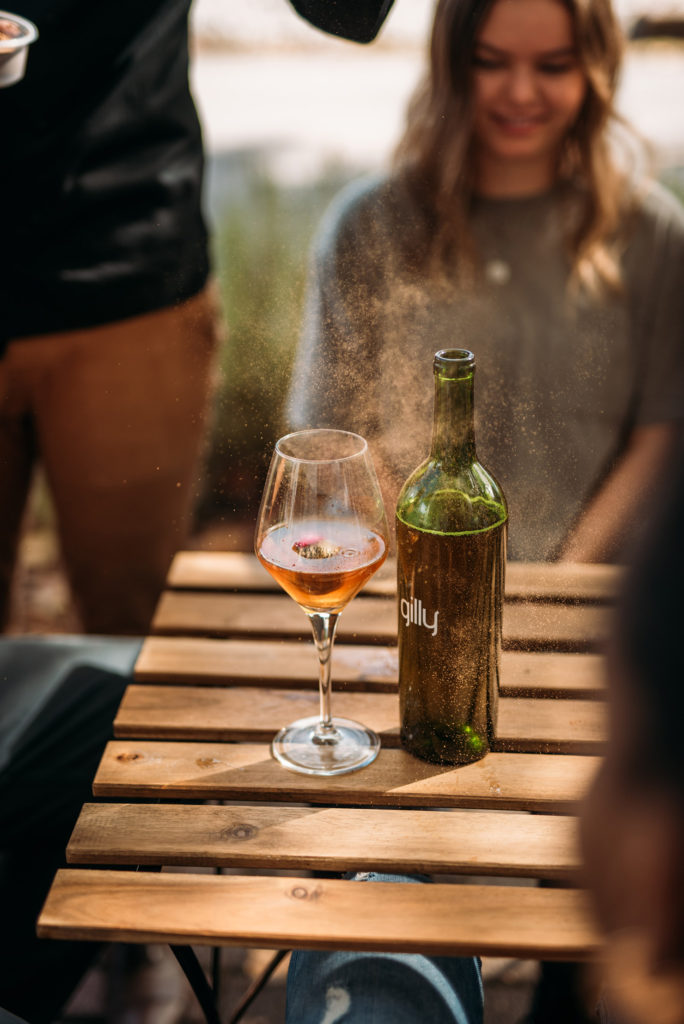
I reread your Sprudge Twenty interview today in advance of our call — that’s always fun, to look back a couple of years ago and see where we were at, and then be able to pick back up some parts of that. This quote stood out:
“Much of Western culture is saturated with excess. The monitoring of caffeine intake per day is not really implemented, I believe it should.”
That’s fascinating; not many Sprudge Twenties are talking about caffeine excess! Is this topic still on your mind?
I stand firm on that man! I think with anything, it’s best to do things in moderation. That’s why I answered your question that way back then—I stand firm on it. Even something like water, as pure as it is and healthy, drinking too much water can actually be an issue, you know? That’s why for people who are professional coffee tasters, like Q Graders, people who are constantly cupping and tasting, they have developed strategies to take care of themselves. Caffeine has effects! Just being able to monitor your intake, I think that’s a principle that should be valued with anything.
Another thing you say in that interview is:
“Sadly coffee shops have become participants and identifiers of gentrification, as opposed to genuinely helping to revitalize and/or reinvest into communities.”
My question a few years later is, do you think this is changing? And as you approach opening a new space in the city of Atlanta, how does this thought process inform that work?
I feel like now, right now, we have a lot more focus on — the phrase is “mom and pop” but I think we mean smaller business in general — now that there are more small business coffee shops, and fewer large chains coming into communities, I feel like that’s starting to change. The cool way to try and create that balance is to be involved in any community you’re doing business in. For the original Gilly Brew Bar in Stone Mountain, my wife and I thought it was really important to move to this community, to live here, even though it wasn’t what we actually *wanted* to do at all. My wife grew up here, and she was ready to move on, but to really help the community grow, we would need to do more than just serving the community by creating a dope coffee shop. We would have to get involved in a bigger way, to help make some of the necessary changes. There’s still a lot of racial tension that occurs here, and being a Black-owned coffee and tea shop, we knew that would disrupt certain things in the community, and so physically being here—meeting the neighbors, going to city meetings, building a relationship with city officials and council members—that really impacted our growth. People didn’t just look at us as this business that was trying to come in and change things for the betterment of profit. They saw us wanting to use what we had to shed light on some of the dark things this city is known for.
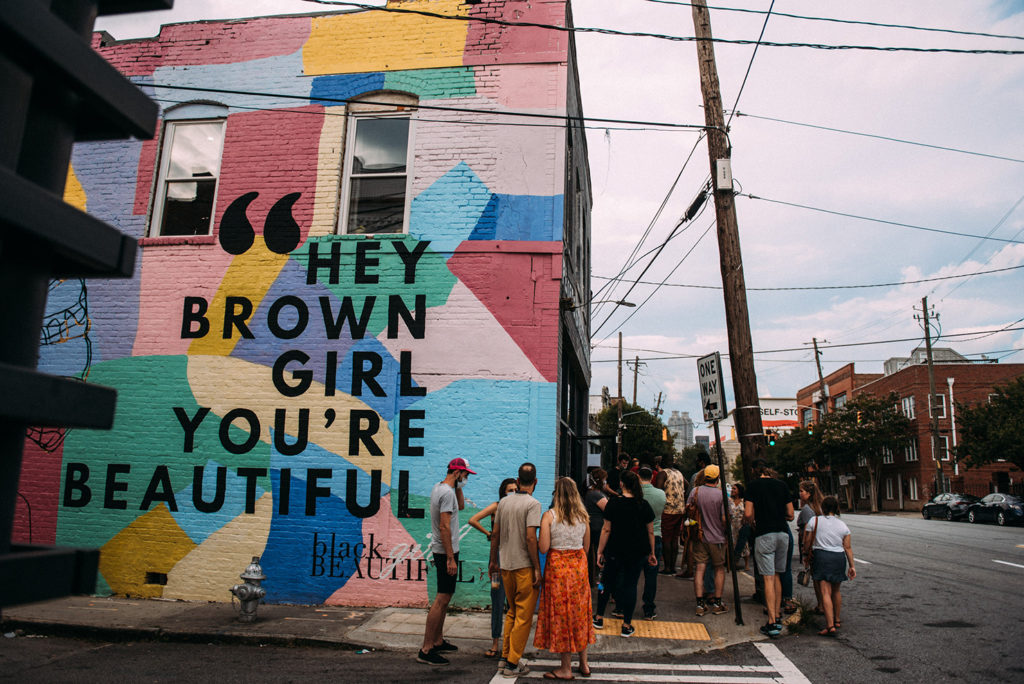
How do you measure that?
Honestly, and I can’t make this up man, but to this very day we have people who come into our coffee bar and say, “We scoped out the community and we’re thinking about moving here because of Gilly.” When do you hear about someone wanting to move to a community just because of a coffee shop? And it’s not just one kind of demographic coming in here—it is a huge, diverse representation of ages, ethnicities, young families, everything—people who tell us they love what we’re doing, and they want to try and get a piece of what you’re creating.
And what will that look like in Atlanta next?
With the Castlebury Hill community, it’s the same thing, man. We’re getting involved in the community meetings there, doing numerous pop-ups before we open, and letting people become familiar with our faces and names. We’ve done three pop-ups there already and I’m starting to know people by name. Those kinds of things play a huge role in this work. The only way you are really going to be able to meet the needs for a community is to first know what those needs are. And I think most coffee shops that come in and are profit-driven don’t necessarily think that way.
But to get back to your question—has the gentrification narrative in coffee changed—you know, I believe it will get better moving forward and has been getting better lately. I think a lot of business owners now aren’t necessarily trying to open multiple shops, and that will definitely help create that balance. When you have multiple locations and have to produce, produce, produce to meet demand, that’s where the disconnect happens, in my opinion. It’s hard to maintain a strong relationship with the community when you’re trying to meet demand.
You know, my goal isn’t to have 100 different Gillys around the world. It would be great to be able to share these stories with more and more people, but I have other ways I’m hoping to do that, and it doesn’t require me to open 10 stores in LA and 10 more in Chicago. To me, it’s more like, “slow and steady wins the race.” That’s what my grandmother always says, and I like to stay true to that. We have something here that’s such a gem, this concept, and my team and I, we want to be great stewards of the concept and not forget how we got to where we are. It all comes back to community. It’s a beautiful thing, man!
Thank you.
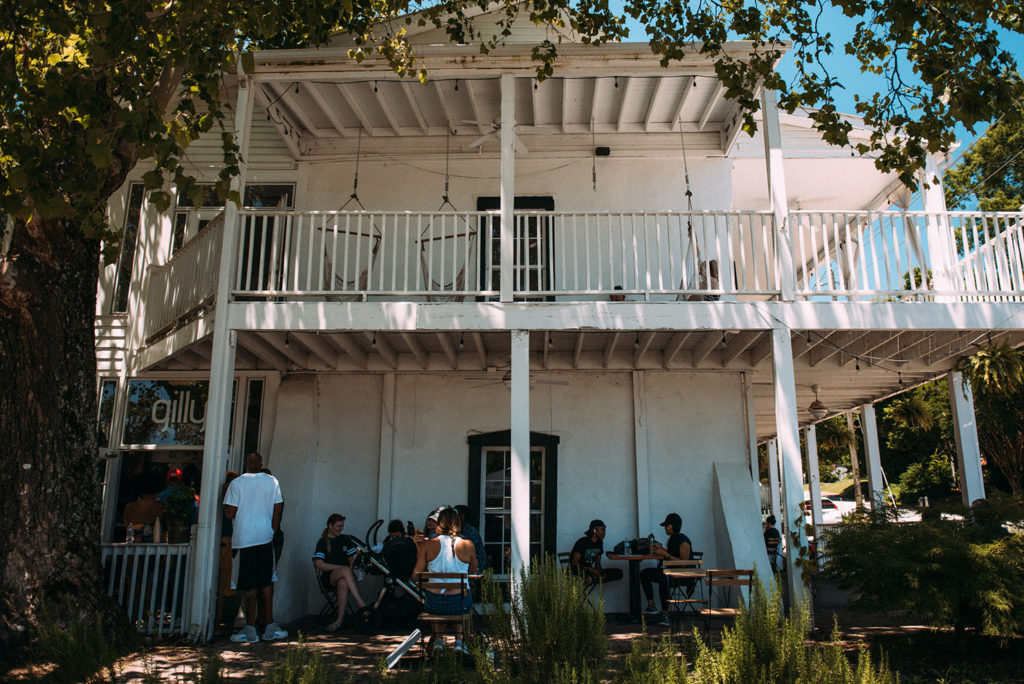
Jordan Michelman (@suitcasewine) is a 2020 James Beard Award winner for journalism, a 2020 Louis Roederer International Wine Writers’ Awards shortlist in the Emerging Wine Writer category, and a 2021 City and Regional Magazine Association Awards nominee in the Feature Story category. He is a co-founder at Sprudge Media Network. jordanmichelman.com
Photos in this feature are by Mary-Claire Stewart (@maryclairephoto) and courtesy Gilly Brew Bar. maryclairephoto.com